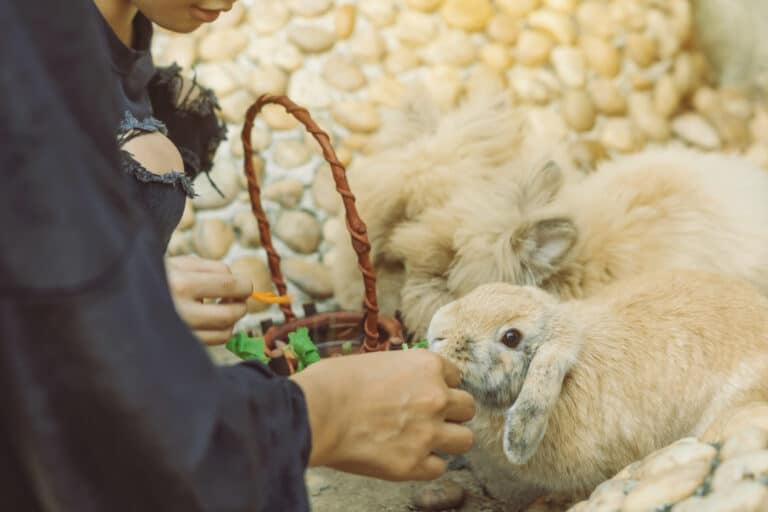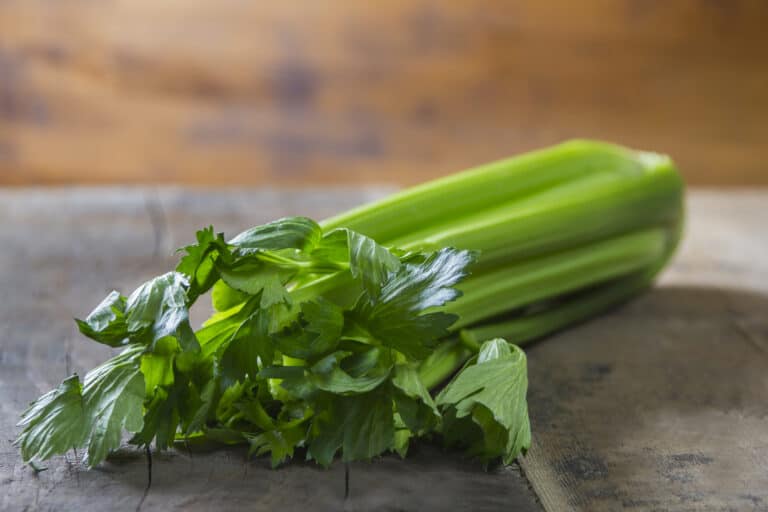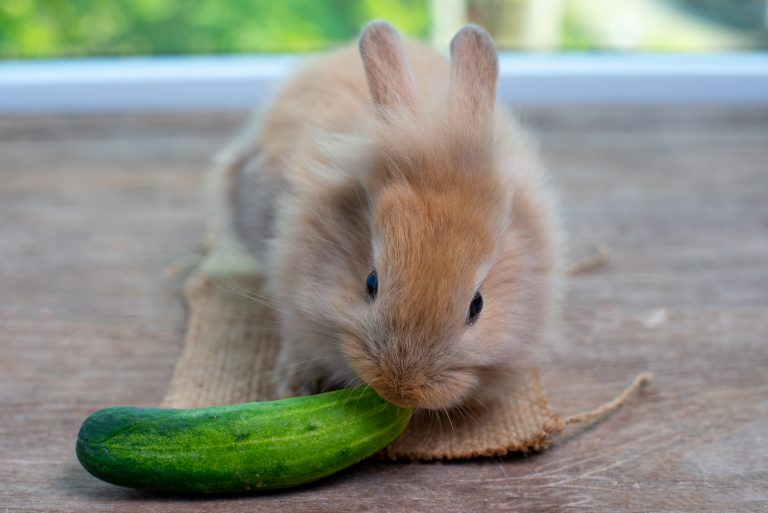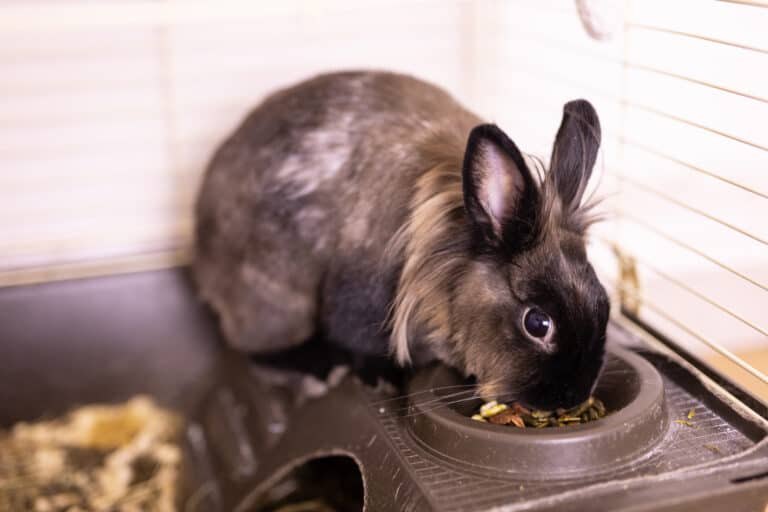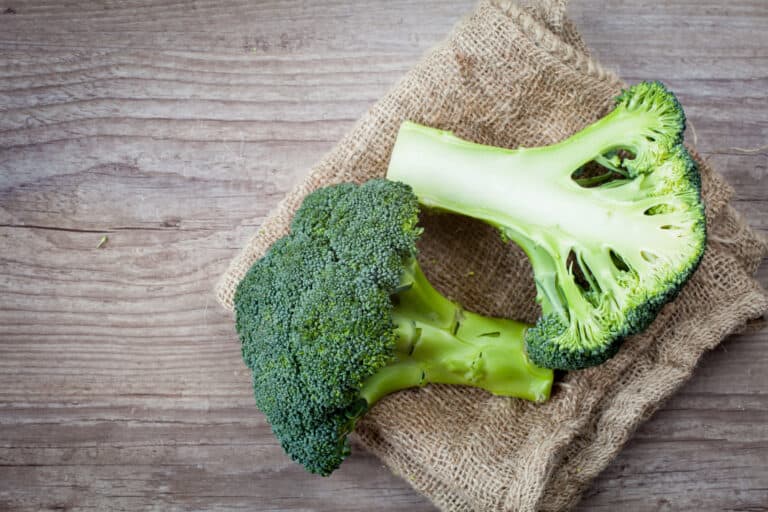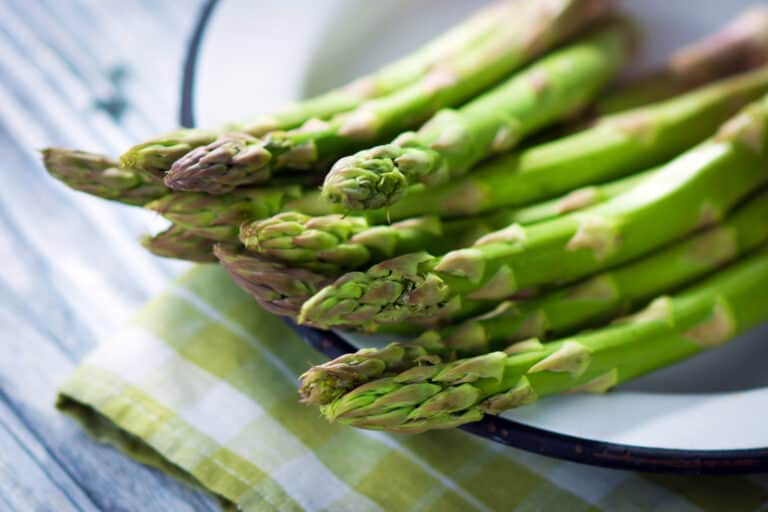Can Rabbits Eat Mango? Facts You Need to Know
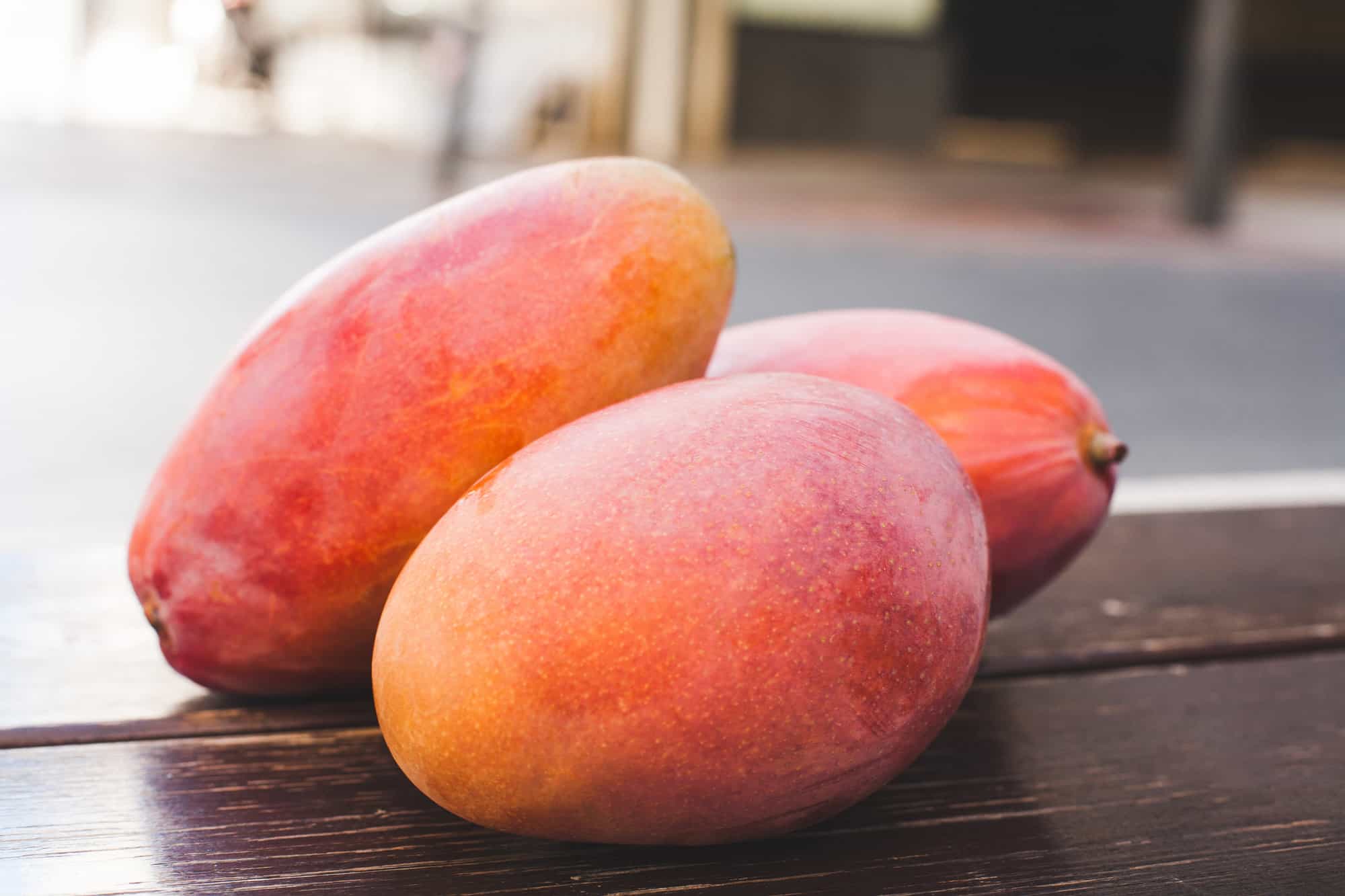
If you love this juicy, luscious fruit, you might wonder if you can share the treat with your fur baby. Well, we have great news for you. Although a rabbit’s diet should consist mainly of fresh hay, an occasional treat of rabbit-friendly fruits and veggies would be most welcome to your pet. So to answer the question can rabbits have mango, let’s see what’s in this delicious fruit to find out if it’s safe and healthy for your furry companion.
The Nutritional Value of Mangoes
Mangoes taste amazingly great. They’re sweet, juicy, and oh-so-yummy. But it’s not just their scrumptious flavor that makes them a welcome treat for rabbits. They’re also packed with essential vitamins, minerals, and other good stuff that can help turn your pet into one happy and healthy bunny.
First off, mango is a good source of vitamins rabbits need, such as vitamin A, vitamin C, vitamin K, vitamin B6, and vitamin E. These vitamins work together to boost your fur baby’s immune system.
The luscious fruit also provides dietary fiber. This is essential for your rabbit’s digestive system as fiber helps the food move along faster in his gut while slowing down the release of blood sugar in his system.
Meanwhile, the calcium and potassium in mango help maintain healthy body functions. The same is true for the lutein, iron, phosphorus, and beta-carotene the fruit offers.
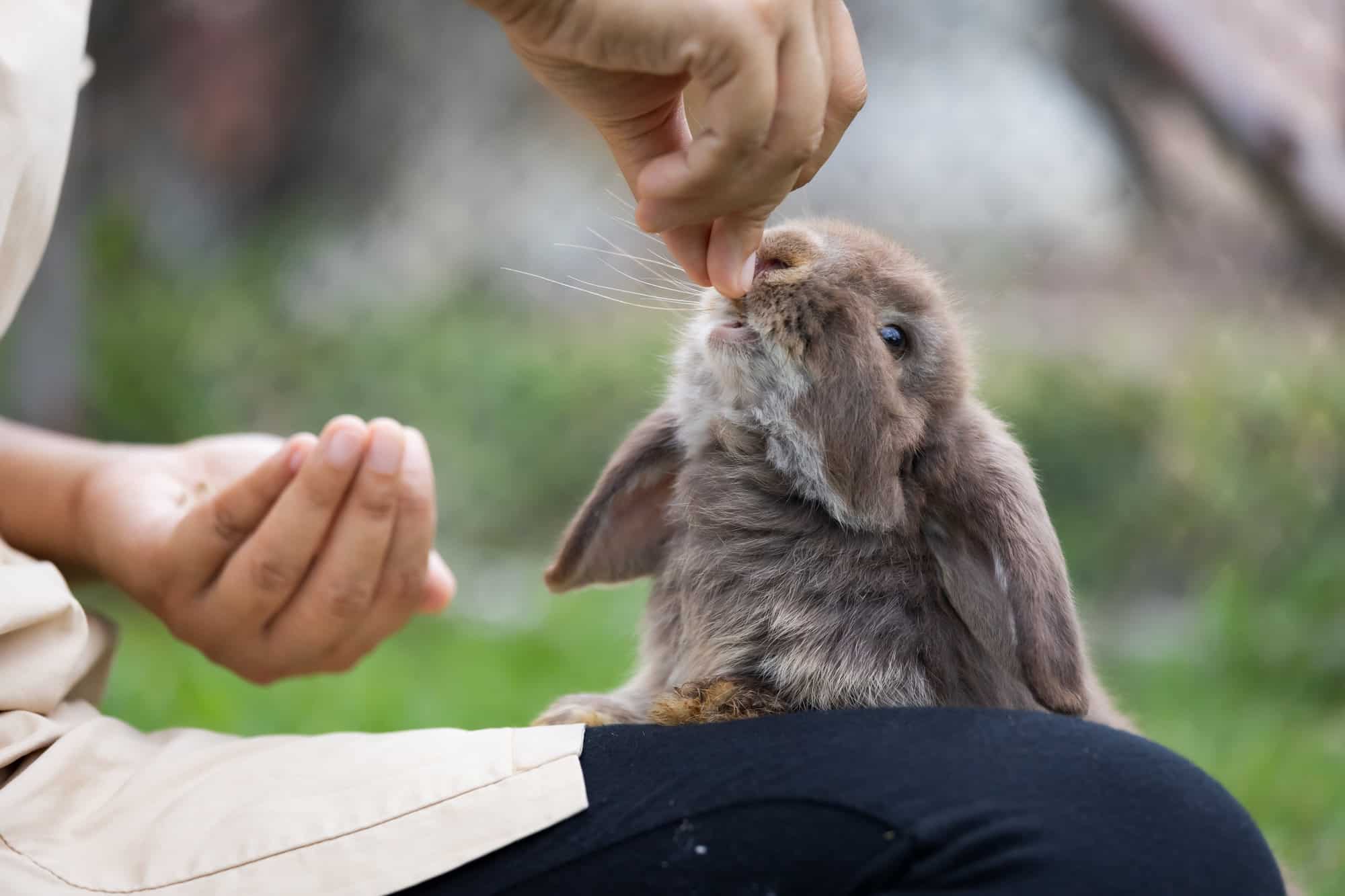
Can Rabbits Have Mango?
The fruit’s nutritional profile shows why rabbits can have mangoes and benefit from them. The vitamins, minerals, and fiber mango contains aid in rounding up their diet. However, keep in mind that mango has high sugar content. So while the fruit is safe for rabbits, giving your pet too much could impact his health.
The serving portion is key. Like other fruits that contain high levels of sugar, such as apples, bananas, and melon, you should feed only small amounts to avoid any problems. By offering only small quantities, your fur pal gets to enjoy the taste and health-giving benefits of the fruit without experiencing adverse effects.
How Often?
Mango, like most fruits, has high sugar content. A rabbit’s digestive system is designed for a diet rich in fiber and low in sugars and starches. So when your bun eats sugary foods, it sometimes disrupts the balance of bacteria in his gut. This can lead to digestive problems like diarrhea and bloating.
A high amount of sugar in his diet can also encourage potentially dangerous bacteria to multiply in his gut, which can slow down the movement of his digestive system. This can lead to GI stasis, a condition that can be fatal to rabbits.
To play it safe, rabbits can have mango about 2 to 3 times a week and offer only small portions.
Serving Size?
Although mangoes have excellent nutritional value, they shouldn’t be on your bun’s daily menu. As we mentioned, the fruit’s high sugar content can pose risks to your rabbit’s health. However, you can still safely feed this delicious fruit to your bun without worries. That’s if you consider it an occasional treat and give small amounts.
The ideal serving size is a tablespoon of fresh mango for every 2 pounds of rabbit. So if your bun belongs to the larger breed, he can have more fruit than one that’s a mini or dwarf breed. Take note, though, that this portion is good per day and not per feeding, and it’s only for adult rabbits.
Risks of Feeding Mango to Rabbits
The essential vitamins and minerals mango contains make this tropical fruit a great rabbit treat. Still, there are risks you should consider before giving mango to your pet.
High sugar content
Bunnies with high levels of sugar in their diet can develop several health issues. These include diabetes and obesity. Also, eating sugary foods can wreak havoc on your rabbit’s digestive system.
Acidic Content
This yummy tropical fruit contains natural acids, so feeding your bunny too much can lead to unpleasant consequences. Rabbits have very delicate digestive systems. Their stomachs and intestines are designed to process food with high dietary fiber. Examples of such food are hay, leafy greens, and some veggies, such as kale and lettuce.
Eating something that’s too acidic and in high quantities can throw off the balance of their digestive system and cause all sorts of problems. High acidity can cause inflammation and irritation in a rabbit’s stomach and intestines, which can lead to discomfort, pain, and even diarrhea.
Pesticides Used
Pesticides are frequently used in growing many types of mangoes, and the chemicals sometimes get absorbed by the fruit, the leaves, and even the soil. In simpler cases, the chemicals only stick to the skin of the mango.
Because rabbits have a delicate digestive system, ingesting even small quantities of the toxins from the pesticides can cause digestive problems like diarrhea, vomiting, and even death in severe cases.
Presence of Parasites
Mangoes can be affected by various parasites, including insects, mites, nematodes, and fungi, during various stages of the growing process. So the mango you get can have parasites even if the growers take great care to keep their produce safe. These parasites can be harmful to your bun and lead to health issues.
Fruit Ripeness
Unripe mangoes are safe for rabbits, although some don’t care much for the fruit’s hard texture and tangy taste. Most prefer the sweetness of a fully ripened version. This means you can give your pet the fruit in either state of ripeness.
However, overripe ones can cause gastrointestinal diseases.
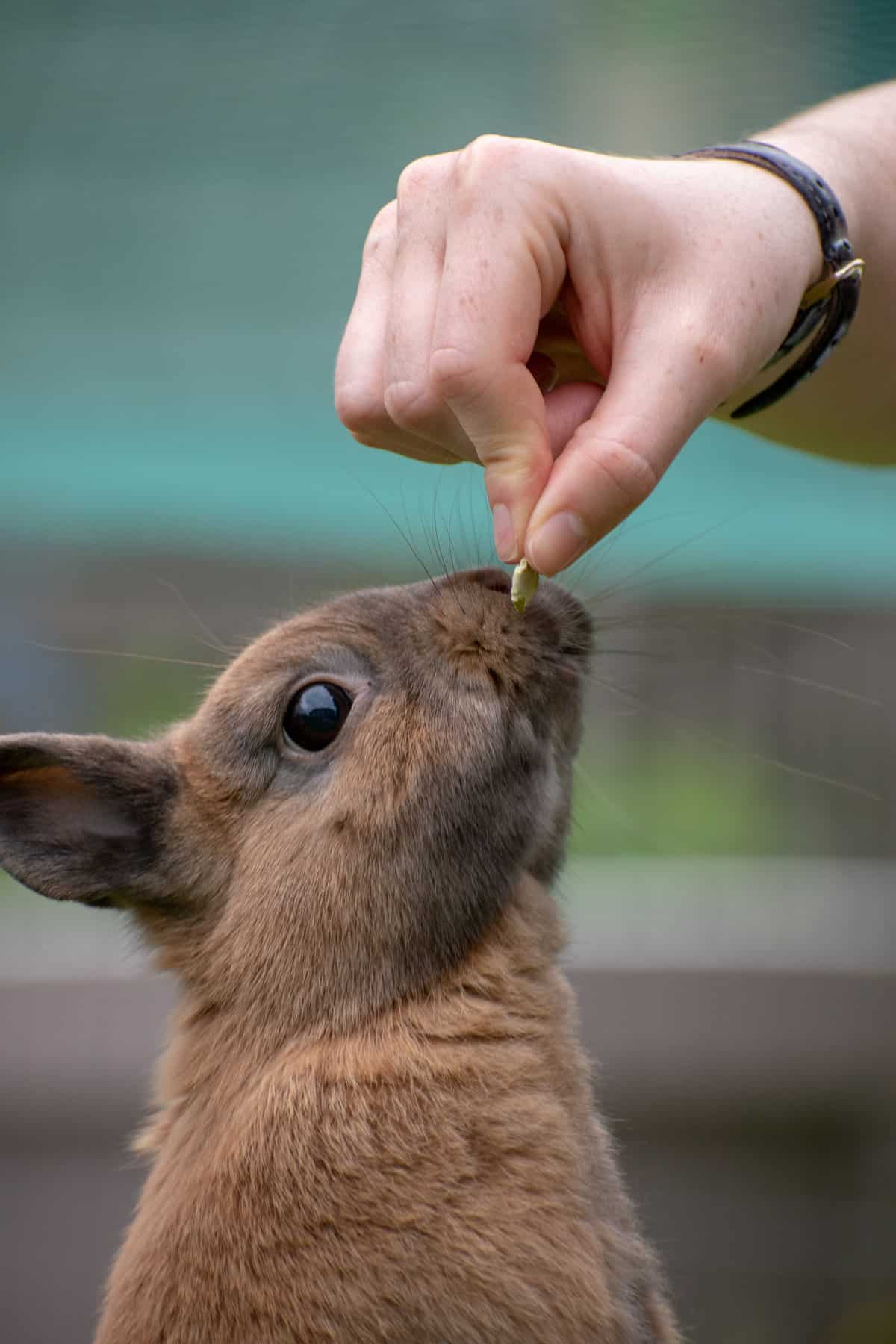
How to Prepare Mango for Your Rabbit
Being packed with vitamins and dietary fiber, mangoes make healthy and delicious snacks for your bunny. However, before you toss him some delectable pieces, you’ll need to prepare the fruit properly. Here’s the best way to serve mango and ensure your pet gets the most out of the yummy treat.
- As much as possible, offer your bunny organic mango: This lowers the possibility of your pet ingesting harmful pesticides. If you can’t get organic ones, wash the fruit thoroughly to remove dirt and pesticide residues.
- Inspect the mango carefully: Check for molds, parasites, blemishes, and signs of bruising to ensure you’re giving your bun high-quality fruit that’s safe to eat.
- Cut the mango into small pieces or cubes: This lets your bunny easily eat the fruit and lessens the mess. The juice dribbling from the fruit is sticky, and because bathing isn’t recommended for rabbits, you’ll need to help him eat his treats neatly. Slicing the fruit is the best way to avoid getting your pet covered in juice.
- Start slowly: Just like when you introduce new food to your bunny, offer a minuscule amount at the start. Watch for any adverse reactions; if there are none, you can give a bit more next feeding time.
Can They Have Mango Juice?
A small amount of mango juice won’t harm your bunny. Sometimes, vets even recommend giving your pet a sip if he’s not eating properly. This is to jumpstart his appetite because rabbits can’t last long without food.
Still, don’t make mango juice a mainstay of his diet as it contains a high amount of sugar. It’s also acidic, which can throw your rabbit’s digestive system out of whack.
What About Dried Mango?
While dried mango can be a tasty snack for humans, the same doesn’t hold for rabbits. Like mango juice, the dried fruit also has high levels of sugar, which is not suitable for bunnies. Also, dried fruits often contains preservatives that may be harmful to rabbits. Your pet is better off eating fresh mango rather than its dehydrated version.
Can Rabbits Eat Mango Leaves?
Mango leaves are non-toxic to rabbits. Moreover, they contain nutrients that benefit your pet. However, even though rabbits are herbivores, mango leaves may be too hard for some buns to digest due to the tough texture. Try giving only small amounts and see how it goes.
If you want to feed mango leaves, offer those fresh from the tree and wash them thoroughly before serving them to your fur baby.
Should You Let Your Rabbit Have Mango Seeds?
While the flesh of the mango fruit can be a healthy and tasty addition to a rabbit’s diet, avoid giving the seed. Mango seeds are hard and fibrous and can pose a choking hazard to buns. Moreover, they contain cyanide, a toxic substance that can harm rabbits if ingested in large quantities.
The amount of cyanide isn’t enough to harm humans. However, rabbits are much smaller, making them more susceptible to the damaging effects of the chemical compound.
Do Mangoes Have Oxalic Acid?
You’ve probably heard that eating foods high in oxalic acid can lead to several health issues in rabbits. Naturally, you’ll want to avoid giving your bunny fruits or veggies with high oxalates.
Fortunately, although oxalic acid can be found in mangoes, the level isn’t a cause for concern. That’s if you serve only small amounts and only a few times a week.
Can Baby Rabbits Have Mango?
Young buns have more sensitive digestion than adult rabbits. As such, their diet should consist mainly of their mother’s milk and some alfalfa hay until they’re around 4 months old. Fruits like oranges, grapes, and mangoes can be introduced when baby rabbits are fully mature.
So, can rabbits have mango? The answer is yes, but in moderation. Mangoes provide some nutritional benefits to rabbits, but they are also high in sugar and should not be a staple food in their diet.
Offer mango as a treat if your bun enjoys the taste but give only small amounts and make sure your bunny eats more of the food he needs, such as fresh hay and leafy greens.
More on Rabbit Diet
- Is Orchard Hay Good for Rabbits?
- The Best Lettuce for Rabbits: What Type Can They Eat
- Complete Guide to the Best Hay For Rabbits: Reviews & More
- What Can You Feed Wild Rabbits: A Comprehensive Guide
- Can Rabbits Have Cabbage? What You Need to Know!
We hope you enjoyed this post! If you did, will you give it a share or two 🙂 Thank you! ~from Every Bunny Welcome


